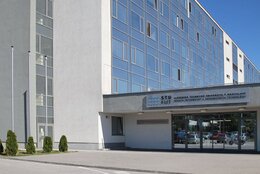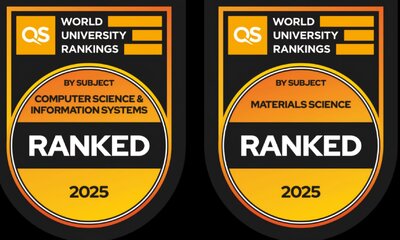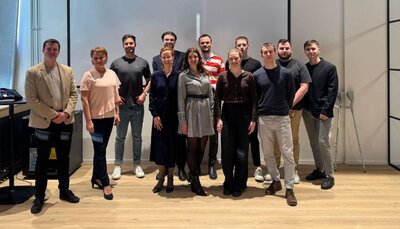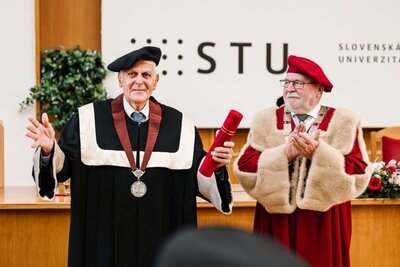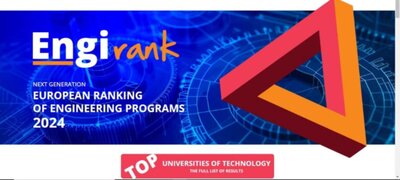

Horizon 2020, Marie Sklodowska – Curie Actions, Individual Fellowships
Expression of Interest for hosting Marie Sklodowska – Curie fellows at Slovak University of Technology in Bratisla
Interested institution:
Department of Mathematics
Institute of Information Engineering, Automation and Mathematics
Faculty of Chemical and Food Technology
Slovak University of Technology in Bratislava
Radlinskeho 9
812 37 Bratislava
Slovakia
https://www.uiam.sk/?lang=en
Brief Description of the Institution
Slovak University of Technology in Bratislava is a modern educational and scientific institution. Since its foundation in the year 1937 more than 159.000 students have graduated there. In average, 12.000 students study at the STU every year.
At present, STU consists of seven faculties that provide research in a number of research departments and several centres of excellence following a long-term strategy when the priority areas are biotechnology and biocompatibility; sustainable resources and development: energy and raw materials; sustainable resources and development: environment, landscape and urbanism; nanotechnology, nanosciences and multifunctional intelligent materials; information society technologies; life, health and environment; safety, reliability and quality.
All the STU faculties provide study in accredited study programmes within the complex system of bachelor, master and PhD study. Faculties realise credit system compatible with the European credit transfer system enabling mutual mobility of students within European Union member countries and a larger European space. In the area of scientific and research activities the STU successfully joins European Union programmes.
The Institute of Information Engineering, Automation, and Mathematics focuses on education, research, and applications in the following areas: uncertainty modelling, fuzzy sets and fuzzy logic, information technologies, optimisation and process control. Researchers from the Department of Mathematics are working in a world leading research group in the area of aggregation functions which has been formed in the last 30 years on the Slovak University of Technology in Bratislava.
Please tick the areas of research (as established in Marie Sklodowska Curie Actions): Mathematics (MAT) - M2 Applied Mathematics
Research / Project Description
Representation of a finite system of data by a single representative value is a problem arising in almost each scientific domain. The procedures for determining such representative value from given numerical values follow the properties required in the considered domain. The contemporary framework of aggregation functions is one of the examples. Nowadays, due to requirements of technical branches, a great attention is devoted to the aggregation of data represented by fuzzy sets and their generalizations.
The basic property of aggregation functions is increasing monotonicity in each variable. However, there are many fusion techniques successfully applied in real data processing which do not satisfy the standard monotonicity constraint. In order to introduce functions extending/generalizing the notion of standard aggregation functions, the monotonicity was relaxed and the notion of fusion functions and subsequently the notion of directionally monotone fusion functions were introduced.
As an application area of aggregation and related functions we mention image processing where the need of information fusion arises in almost every step, e.g., in fusion of intensities associated to a set of adjacent pixels, edges, structures, in image fusion, etc. It is often necessary to identify a possible overlapping between data to be fused, as well as to detect increasingness/decreasingness patterns in data. Directional monotonicity of fusion functions provides a very good tool for characterization of directions along which pixels vary.
The above mentioned ideas indicate the goal of the proposed project: the investigation of generalized fusion functions allowing to process data belonging to more general structures (e.g. intervals, linguistic scales, bounded distributive lattices) with the focus on intervals. The more specific goal is to introduce the notion of interval-valued Choquet integral, to develop the corresponding theory and to apply the theoretical results in image processing problems.
Who can apply?
The potential applicants must meet the conditions set out within Marie-Sklodowska-Curie-Actions Individual Fellowships call at:
https://ec.europa.eu/research/participants/portal/desktop/en/opportunities/h2020/index.html
At the deadline for the submission of proposals (11/09/2019), researchers (*):
- shall be in possession of a doctoral degree or have at least four years of full-time equivalent research experience
- must not have resided or carried out their main activities in Slovakia for more than 12 months in the 3 years immediately prior to the abovementioned deadline
Contact person
Dr. Zdenko Takáč
Associate professor
zdenko.takac@stuba.sk
+421-918-674296
https://www.uiam.sk/index.php?menu=2&show_id=3&person_id=406884
Applications: documents to be submitted and deadlines
Please, contact us as soon as possible in order to coordinate the preparation of the proposal.
The following documents will be required:
- Motivation letter
- CV of the applicant
Please note that:
Deadline of the next call for proposals for Marie Sklodowska – Curie Individual Fellowships is September 11th, 2019.
Further contact and information requests will take place directly between the host institutions´supervisor and the interested researchers.
(*) Further details on the Call and additional eligibility criteria can be found at the Funding&tender opportunities Portal https://ec.europa.eu/info/funding-tenders/opportunities/portal/screen/opportunities/topic-details/msca-if-2019

